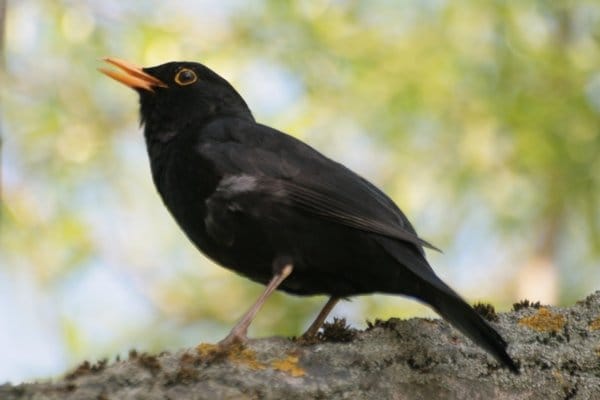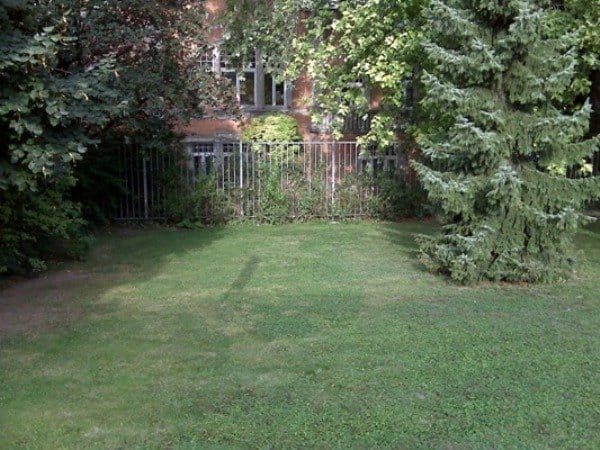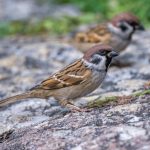It was a dark and stormy night.
Turdus “Blacky” Merula sat near the trunk of the small evergreen in the backyard that was his territory’s centre, hunkered down and head tucked in to shelter from the rain. He was an old male in his prime, and he had seen many things – but never had he envisioned dark times like these.
The darkness was all around him. It sheltered him, it haunted him, and it set his thoughts adrift, to the warmth of spring and the family he had. All were long gone. He was alone. And he was all that remained.
The bolts of lightening and the thunderclaps drew his attention back to where he was, to the heavy downpour, the branch, and the isolation. And to a peculiar noise outside the covering branches of the bush, a noise not unlike the flurries of the storm that battered the leaves, yet distinctly different – and approaching.
He was a careful and vigilant bird, traits that had saved him from the hawks and the cats on so many occasions while those around him had perished over the years. He was not foolish enough to be drawn to danger out of curiosity. But this was different. He got up and slowly hopped along the branch to the perimetre of the bush, where the leaves formed a dense umbrella that blocked the view onto the yard beyond. Finding a small gap in the leaf cover, he peeked out into the night. Nothing, only darkness. Wanting a wider field of view, he slowly, reluctantly pushed his head through the gap and into the rain. A swaying movement to his left alerted him to the presence of someone, something, nearby. As he turned his head to investigate, a flash of lightening cast its cold white light onto a tall hooded silhouette, veiled in a cloak of darkness and decay. He had come at last to take him, too. And with the descent of the blade, the Reaper brought in the harvest of another soul to join the ones departed.
I am not exactly certain that this is what happened around Heidelberg this summer. But something happened, and it happened many times:
.
Something has been killing our Blackbirds.
.
We interrupt this blog post for an important message:
This is the kind of Blackbird I am talking about, the Eurasian thrush that is Turdus merula, and not the American group of iconic Icterids you might have had in mind.
But there is a catch:
Something has allegedly, apparently, with increasing probability as we gather more data, … been killing our Blackbirds.
Why aren’t we entirely sure?
The problem is that Blackbirds are incredibly common in suburban and even urban areas of Germany. Birders appreciate them for their song and the life they add to our lawns, but they don’t note them in the sense of writing down numbers. Blackbirds are just there, everywhere, and always. And of course there is seasonal variation.
Now all of a sudden in late summer someone comes up with the question “Where are the Blackbirds?” and everyone is very surprised and starts wondering and looking for them, and lo and behold, they are gone! Almost completely gone. But who can say if this is a normal occurrence at the end of the breeding season, possibly related to them being more secretive during their moult, or if this is not normal? No one, that’s who. We are lacking quantitative data from other years. However, the fact that the species is completely gone and cannot be found even by birders who walk for several miles through prime habitat specifically searching for them is very striking. Then there is the fact that people find many dead Blackbirds – whether we are finding more than in other years because there are more dead birds or because we pay more attention now is unclear, but it is striking nonetheless. And perhaps most significantly: the apparent lack of Blackbirds is currently restricted to a rather well-defined area around Heidelberg and Mannheim. Birders outside this area, even as close as Karlsruhe, have no idea what we are talking about as they are still seeing their usual huge numbers of Blackbirds wherever they look and go.
And then there is the fact that the very few Blackbirds we find alive show three very peculiar and unusual traits:
1. Tameness – Blackbirds are always rather tame, what with living in our backyards and such. But the amount of “tameness” we are currently seeing is exceptional. If we are lucky enough to find a living Blackbird, we can usually approach it openly and directly to within half a metre or less. The birds however appear quite normal and healthy, so the tameness is not due to the fact that they are too weak to move off.
2. “Rodent-Syndrome” – Okay, they are ground-dwelling birds that can on occasion actually submerge in a pile of autumn leaves in search of worms, but the few Blackbirds we are seeing now act so unusual that it is just bizarre. They will walk underneath ground vegetation that is merely 15 cm high concealed like a mouse. One of the two birds I found last weekend had me convinced I was about to see a rat when I spotted movement in the nearby ground vegetation.
3. Plumage in bad shape – their plumage, particularly the feathers covering the body, is in very bad shape and especially the neck is practically naked. This may be normal for Northern Cardinals or Blue Jays during autumn moult, but this is not something we are usually seeing on our Blackbirds, even moulting ones.
.
This just smells like an epidemic, possibly comparable to the one that occurred around Vienna in recent years. This epidemic, which was caused by the Usutu virus, also severely affected mostly Blackbirds.
A few dead birds we found around Heidelberg were sent to a laboratory for analysis, but I don’t know when or how or if at all the results will be made public. We will see, and we have to wait to see.
These are strange times. I am not worried about the species as a whole and am sure that whatever has happened or happens, they’ll be back in Heidelberg with a vengeance before too long. However, it does make me wonder what the next spring will be like and if at least for a year or two, we will face a spring without the songs of Blackbirds.
In suburban Germany, this will essentially mean a silent spring. An eery and grim perspective with winter just around the corner.
The lawns are crying.
















http://www.bbc.co.uk/news/science-environment-14380813
I would be very upset if the American Robins from my neighborhood disappeared on me…let’s hope “Blacky” can come back quickly!
Very interesting post Jochen. Thanks for making us aware of this.